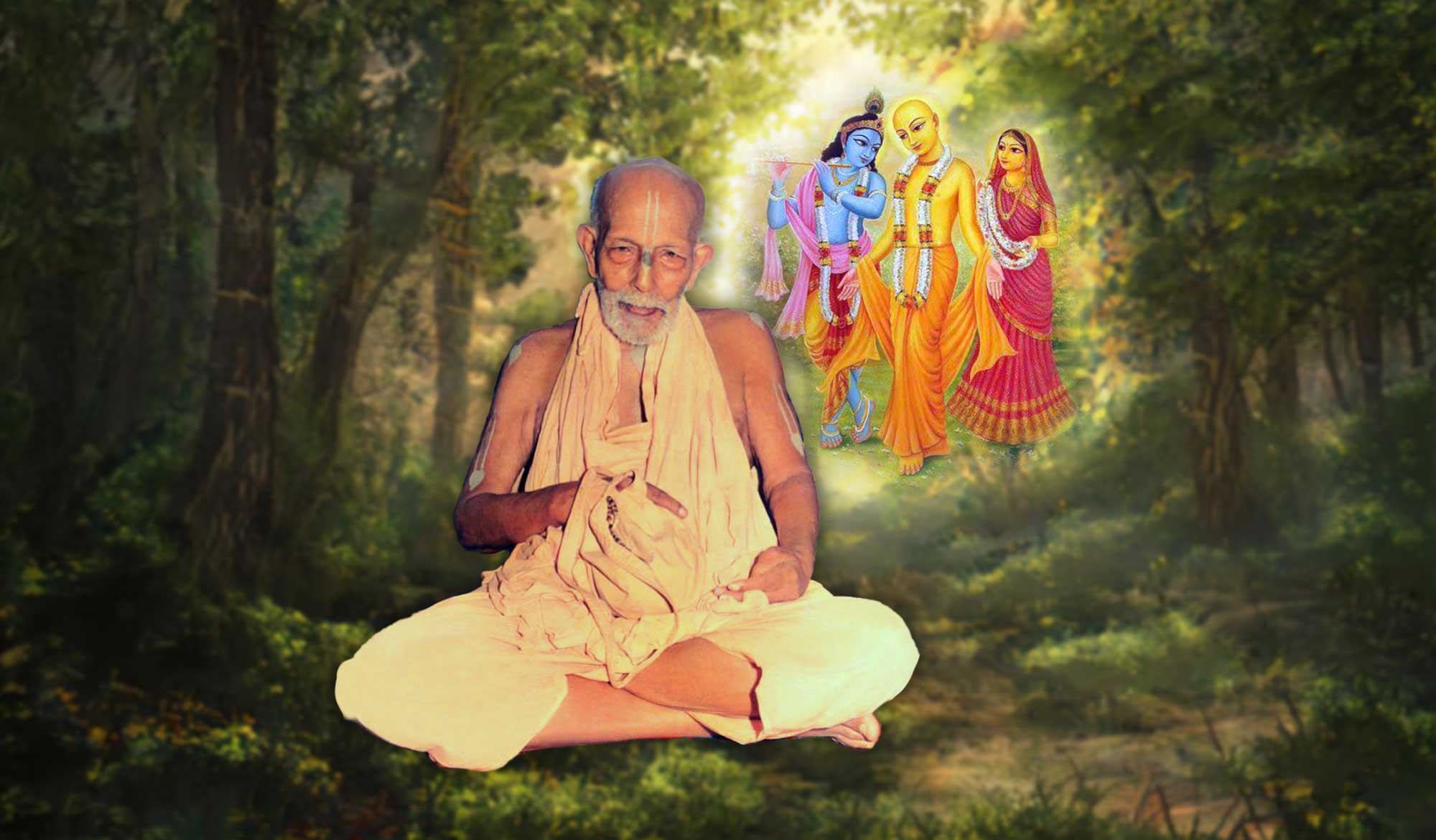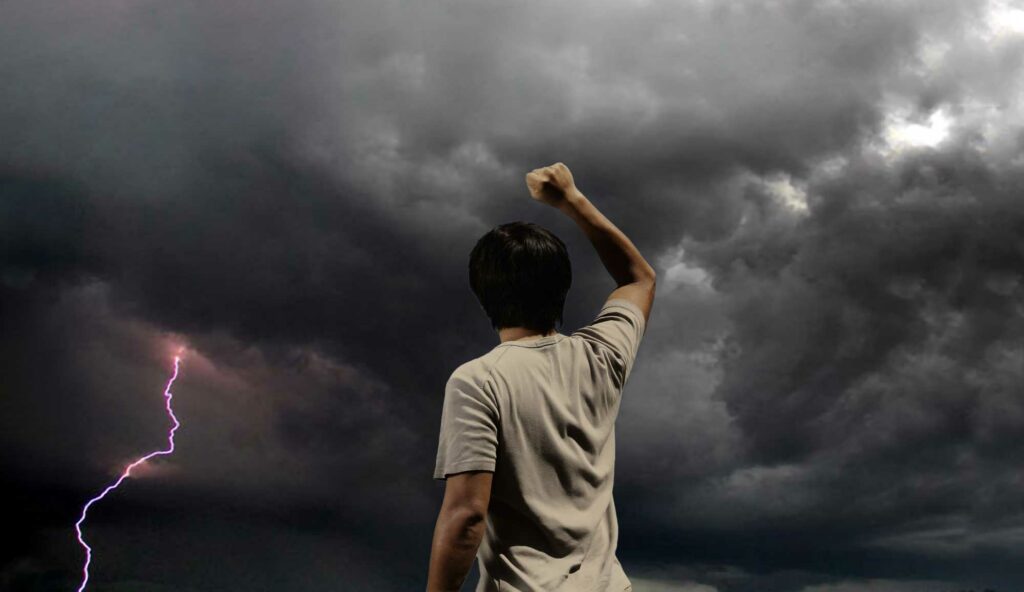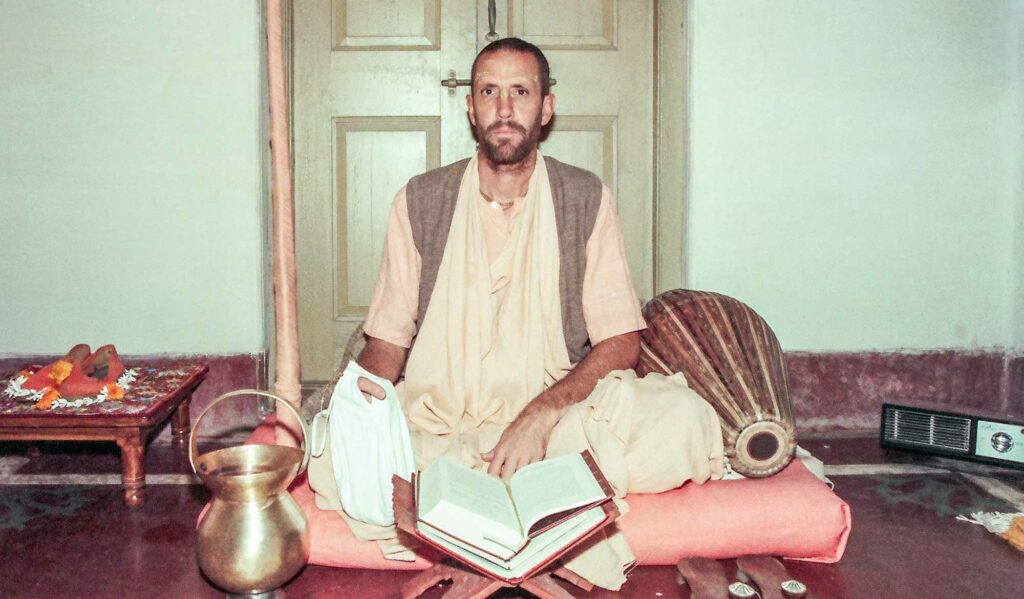Overview
‘Śrī Śrī Gaura Gopāla Praśasti’ (In Praise of Śrī Śrī Gaura Gopāla) is a Bengali composition by Śrīla Bhakti Pramoda Purī Gosvāmī, in praise of the pastimes and teachings of Śrī Caitanya Mahāprabhu. Śrīla Purī Gosvāmī also explains the non-difference between Gaura and Kṛṣṇa and the importance of nāma-bhajana. This was first published on March 29th 1964 in Śrī Caitanya Vāṇī magazine, Volume 2 Issue 4, and translated into English by Swami B.V. Giri.
Śrī Śrī Gaura-Gopāla Praśasti
(In Praise of Śrī Śrī Gaura-Gopāla)
By
Śrīla B.P. Purī Gosvāmī Mahārāja
(1)
vrajendra-nandana hari, rādhā-bhāva kānti dhari’
māyāpure janama labhila
antaḥ-kṛṣṇa bahir-gaura, nāma laila ‘viśvambhara’
prema diyā bhuvana bharila
Śrī Hari, the son of the king of Vraja, accepting the heart and halo of Śrī Rādhā, took birth in Māyāpura. Internally He was black (Kṛṣṇa) and externally He was golden (Gaura). Accepting the name Viśvambhara, He inundated the world with prema.
(2)
vraja-parikara yei, gaura-parikara sei
āge pāche saba prakaṭila
tāṅ sabāre saṅge kari’, bhakta-bhāva aṅgi kari’
vraja-prema-rasa-āsvādila
Those associates in Vraja are the associates of Gaura and they all manifested before and after His appearance. In the company of all of these associates and accepting the sentiments of a devotee, He relished the rasa of vraja-prema.
(3)
śrī nanda yaśodā yena, śacī jagannātha tena
mātā pitā tāṅhāra haila
rohiṇī-nandana balāi, dharilena nāma nitāi
jyeṣṭha bhrātā rāḍhe janamila
Śacī and Jagannātha, who are Yaśodā and Śrī Nanda, became His mother and father. Balāi, the son of Rohiṇī, accepted the name Nitāi and took birth as His brother in Rāḍha-deśa.
(4)
gaurāgraja-viśvarūpa, nityānanda-aṁśa-rūpa
gṛha-tyagi’ sannyāsī haila
pandharapurete giyā, śaṅkarāraṇya nāma lañā
yathākāle siddhi lābha kaila
Viśvarūpa, the elder brother of Gaurāṅga, was a form of a plenary portion of Nityānanda. He left home to became a sannyāsī. He went to Pandharapura and took the name Śaṅkarāraṅya. In due course of time He attained perfection.
(5)
(nitāi) avadhūta veṣa dhari’, deśe deśe ghuri ghuri
śeṣe āsilena vṛndāvana
yamunāra kūle kūle, bhrātāra virahe bule
‘kothā bhāi’ ḍāke anukṣaṇa
Nitāi took the garb of an avadhūta and, travelling from country to country, He finally came to Vṛndāvana. Walking along the bank of the Yamunā, He constantly called out in separation from His brother, “O bhāi! Where are You?”
(6)
navadvīpe ‘channa’ haye, ācche bhāi lukāiye
bujhi tāṅre milibāre cāya
śīghra āsi māyāpure, nandana-ācārya-ghare
lukāila nityānanda-rāya
Then He understood that His brother was in disguise, hiding in Navadvīpa and He wished to meet Him. He quickly came to Māyāpura and there Nityānanda Rāya hid in the house of Nandanācārya.
(7)
edike agraja mane, milite satṛṣṇa mane
pathapāne ceye ācche gorā
du’nayane vahe dhāra, hayeche pāgala-pārā
‘bhāi bhāi’ bali ātmahārā
Meanwhile, thinking about His elder brother and longing to meet Him, Gaura watched the road. Tears flowed from both His eyes and He became mad as He forgot Himself while chanting, “Brother! Brother!”
(8)
sahasānubhave jāni, agrajera āgamanī
chuṭe cale nandanera ghare
du’bhāye milana ha’la, ki ānanda uchalila
na’ devāsī nāce prema bhare
Suddenly, feeling that His elder brother had arrived, He ran to the house of Nandanācārya. When the two brothers met, what feelings of bliss flowed all around! The residents of Nadīyā were filled with prema and began dancing.
(9)
nāmācārya hari-dāsa, mili avadhūta pāśa
mahānande kīrtanārambhila
śrī-advaita gadādhara, śrīvāsādi bhakta-vara
se kīrtane sabe yoga dila
Nāmācārya Hari Dāsa met Nityānanda Avadhūta, and in great bliss they began to perform kīrtana. Śrī Advaita, Gadādhara, Śrīvāsa and other great devotees also joined in that kīrtana.
(10)
āhā se nāmera dhvani, ki madhu varaṣe māni
golokera prema-sudhā-sāra
āpāmare kare dāna, bhāgyavān-kare pāna
pipāsā bāḍhaye anibāra
O the sound of that Name! What sweetness it showered, which was the essence of the nectarean prema of Goloka! It was distributed to the wicked, and those who were fortunate drank it, yet their thirst continued to increase.
(11)
śrī-advaita nityānanda, śrīvāsādi bhakta-vṛnda
gadādhara hari-dāsa saṅge
suradhunī-tīre gorā, saṅkīrtane mātoyārā
hari’ bali nāce prema-raṅge
On the banks of the Gaṅgā, in the company of Śrī Advaita, Nityānanda, Gadādhara, Hari Dāsa, Śrīvāsa and other devotees, Gaura became ecstatic during saṅkīrtana and shouting “Hari!” He danced while being overwhelmed with prema.
(12)
śrīvāsa-aṅgana hala, saṅkīrtana-yajña-sthala
sapta-jihva uṭhe yajñānala
tāhe ātmā-pūrṇāhūti, dena bhakta mahāmati
nāma-rase halena vihvala
Śrīvāsāṅgana became the place of the saṅkīrtana-yajña, and the seven tongues arose in that sacrificial fire.* The high-minded devotees offered their souls as the final oblation and they became overwhelmed in the mellows of the Holy Name.
* Translator’s Note: The seven flames of Agni that are worshipped in a Vedic yajña are kālī, karālī, manojavā, sulohitā, sudhūmra, varṇā, ugrā, and pradīptā. These flames correspond with the seven types of perfection that are stated in the first śloka of Mahāprabhu’s Śrī Śikṣāṣṭakam.
(13)
uchalila prema-dhanya, dharitrī halena dhanya
ānandera āra sīmā nāi
gaurahari hari bali’, nāce bhakta bāhu tuli’
duḥkha-śoka bhulila sabāi
He who is absorbed in prema gushed forth and the earth became blessed, and there was no limit to such bliss. As Gaurahari chanted “Hari!” the devotees danced with their arms raised and everyone forgot all their sadness and misery.
(14)
cabhiśa vatsara-dhari’, gṛhāśrame vāsa kari’
dharma-marma śikhālena gorā
pare halena sannyāsī, kāṅdalena na’de vāsī
rādhā-bhāve halena vibhorā
For twenty-four years He remained in the gṛhastha-āśrama where He taught the essence of dharma. Later, He became a sannyāsī and the residents of Nadiyā wept. Then He was absorbed in the mood of Śrī Rādhā.
(15)
kāṅdilena śacī-mātā, viṣṇupriyā jagan-mātā
bhakta-vṛnda kāṅdiyā vikala
śire buke hāni’ kare, dhairaya dharite nāre
nidrahāra saba teyāgila
Śacī Mātā and Viṣṇupriyā, the mother of the world, shed tears. Overwhelmed, the devotees also wept. Unable to control themselves, they beat their heads and chests and gave up eating and sleeping.
(16)
pūrve yena vraja-vāsī, hārāyei kāla-śaśī
viraha-sāyare nimajila
ebe tena na’de vāsī, hārāiye gaura-śaśī
prāṇa-tyāge saṅkalpa karila
Just as the residents of Vraja had previously lost their Black Moon and were drowned in an ocean of separation, now the residents of Nadiyā, losing their Golden Moon, were determined to give up their lives.
(17)
gaura-śikṣā smari’ pare, ati-kaṣṭe dhairya dhare
phukāri phukāri nāma kare
smariyā gaurāṅga-nāma, netre aśru avirāma
svapne gaura prabodhena tāṅ’re
Later, they remembered the teachings of Gaura, and with great difficulty they tried to control themselves. Aloud, they cried out the Holy Name again and again. Remembering the Name of Gaurāṅga, tears poured constantly from their eyes and in their dreams Gaura consoled them.
(18)
gaurāṅga prakaṭa-kāle, cabhiśa-varṣa nīlācale
prati-varṣa dekhibāre yāya
bhakta-prati kṛpā kari, bhakata-vatsala hari
bhakta-vāñchā sakali pūrāya
During Gaurāṅga’s manifest period He was in Nīlācala for twenty-four years. Every year the devotees went to see Him. Lord Hari, who is most compassionate to the devotees and affectionate to them, fulfilled all their desires.
(19)
gaura-śikṣā-kṛṣṇa-nāma, saṅkīrtana aviśrāma
sarva-śreṣṭha tāhāi bhajana
bala kṛṣṇa bhaja kṛṣṇa, kare śikṣā bhajana kṛṣṇa
sambandhābhidheya prayojana
The instruction of Gaura is that one should engage incessantly in kṛṣṇa-nāma–saṅkīrtana. This kind of bhajana is the best of all. “Chant Kṛṣṇa, worship Kṛṣṇa, and learn how to perform bhajana of Kṛṣṇa in relation to sambandha, abhidheya and prayojana.”
(20)
vraje yāṅre kāṅdāiye, antarāle lukāiye
prema-rasa kaila āsvadāna
ebe tāṅra bhāva laye, phire kṛṣṇa anveṣiye
vipralambha-rase nimagana
In Vraja He made Her weep by hiding from Her and in this way He relished prema-rasa. Now, taking Her mood, He has returned to search for Kṛṣṇa, being immersed in vipralambha-rasa, the mellows of separation.
(21)
nīlambudhi-taṭe gaura, keṅde keṅde hana sārā
rādhā-bhāva sadā vibhāvita
kāṅha kṛṣṇa prāṇa-dhana, bale jhare du-nayana
muhur-muhuḥ hana mūrachita
On the shore of the blue ocean, Gaura continuously wept, influenced by the mood of Śrī Rādhā. “Where is Kṛṣṇa, the treasure of My life?” He would exclaim, as tears poured from His eyes and every now and then He would faint.
(22)
gambhīrāya rātri-dine, svarūpa rāmānanda sane
mahā-bhāve citta gara gara
prabodhena tāṅra yata, vyathā bāḍhe dvi-guṇita
dhairya nāhi mānaye antara
Day and night at the Gambhīra, in the association of Svarūpa-Dāmodara and Rāmānanda Rāya, His heart was fully immersed in mahā-bhāva. As much as they consoled Him, His pain increased. He found no tranquility within.
(23)
kṛṣṇa-priyatamā rādhā, tāṅra preme kṛṣṇa bāṅdhā
sei prema karite pracāra|
svayaṁ kṛṣṇa dayāmaya, gaura-līlā prakaṭaya
dhanya kali sarva-yuga-sāra
Rādhā is the most beloved of Kṛṣṇa, and Kṛṣṇa is bound by Her prema. To distribute that prema, merciful Kṛṣṇa has Himself manifested gaura-līlā. This blessed age of Kali is the essence of all other yugas.
(24)
sei premā lābhopāya, nāma-saṅkīrtana haya
śrī-mukhe kahena gora-maṇi
svarūpa rāma-rāyera kaṇṭha, dhari’ ka’na gaura-kṛṣṇa
nirāśāya āśvāsera vāṇī
The way to attain that prema is to engage in nāma-saṅkīrtana – this came from the divine lips of the jewel-like Gaura. Embracing Svarūpa and Rāma Rāya around the neck, Gaura-Kṛṣṇa gave this message of assurance to those who are without any hope.
(25)
dīna hīna prati āra, eta dayā kothā kāra?
asādhane dena cintāmaṇi
ayācake prema yāce, uccha nīca nāhi bāche
bhaja gaura-caraṇa du-khāni
Who else has so much mercy for the fallen and lowly? He has bestowed a cintāmaṇi gem unto those who are devoid of any abilities. He gives prema unto those who do not even ask for it and does not discriminate between high and low. Let us worship the feet of Śrī Gaura.
(26)
śrī-nāma bhajane haya, gaura-kṛpā atiśaya
aparādha śīghra dūre yāya
kṛṣṇa-prema upajaya, jīvana sārthaka haya
līlā-rase adhikāra pāya
One achieves Gaura’s great mercy through śrī-nāma bhajana, and then offences are quickly eliminated. When kṛṣṇa-prema arises, one’s life becomes successful, and one attains the qualification to enter into līlā-rasa (the mellows of divine pastimes).
(27)
pūraite manaskāma, sarva-śakti-dhara nāma
aghaṭana ghaṭaite pāre
viśvāsa kariyā tāṅre, ye-vāśraya nite pāre
nāma-prabhu uddhāraye tāre
The Holy Name possesses all potency and can fulfill one’s desires, making even the impossible possible. If one has faith and takes refuge in the Name, then Nāma Prabhu will deliver him.
(28)
avatāra-śiromaṇi, śrī-gaurāṅga guna-maṇi
kara mana gorā-pada sāra
bhajana sādhana hīne, ke tāribe gorā vine
kṣamā-guṇa eta acche kāra?
Śrī Gaurāṅga, the gem of all divine virtues, is the crest-jewel of all avatāras. O mind, make the feet of Gaura your only necessity. Apart from Gaura, who else will deliver someone who is devoid of bhajana and sādhana? Who else has such qualities of forgiveness?
(29)
kata janmera aparādhī, pāpī-tāpī mūḍhamati
māyā-moha-mugdha jīvādhama
hena apadārtha jane, rakṣa gaura nija-guṇe
hao gati carama parama
I have been an offender for many births and I am impious, miserable and foolish. I am a fallen jīva thoroughly charmed by māyā. O Gaura, through Your own virtues, kindly protect this nonentity and become my supreme refuge.
(30)
śrī-guru vaiṣṇave mati, nā janmila eka rati
aparādha kari kata śata
āmāra ki habe gati, bhāviyā nā pāi sthiti
kise habe aparādha hata
In this birth, I have not acquired any attraction for Śrī Guru and the Vaiṣṇavas, and I have made hundreds of offences. What will be my destination? Thinking in this way I cannot be at peace. In which way will my offences be removed?
(31)
śrī-gaurāṅga dayāmaya, kṛpā-dṛṣṭi yadi haya
tabe āśā haya taribāra
śrī-guru vaiṣṇava more, prasanna haite pāre
dite pāre sevā adhikāra
If the all-merciful Śrī Gaurāṅga glances upon me with kindness, then there is some hope of my deliverance. If Śrī Guru and the Vaiṣṇavas become pleased with me, they will give me the eligibility of serving them.
(32)
guru-kṛpā nāhi hale, (gaura) kṛṣṇa-kṛpā nāhe-mile
bhajana sādhana vṛthā haya
antarāya nāhi yāya, pade pade bādhā pāya
keha nāhi tāre sambhāṣaya
Without the mercy of Śrī Guru, one cannot attain the mercy of Gaura-Kṛṣṇa, and one’s sādhana and bhajana become futile. Impediments do not go away, there are obstacles at every step, and nobody wants to associate with you.
(33)
lāñcana gañjanā bāḍe, ṣaḍ-ripu nāhi chāḍe
vṛthā vahi mare deha-bhāra
śānti nāhi eka-kṣaṇe, kṛṣṇa-cintā nāhi mane
divāniśi kare hāhākāra
Constantly humiliated and chastised, the six enemies of lust, anger, greed, illusion, pride and envy never yield. Carrying the burden of the body, one dies in vain. There is never a moment’s peace. Thoughts of Kṛṣṇa never enter the mind, and day and night one laments.
(34)
daivi-guṇamayī māyā, atiśaya duratyayā
kara śakti tā’re jinibāra
śrī-kṛṣṇa prapanna hale, māyā jaya avahele
kṛṣṇa-kṛpā sarva-bala-dhāra
The divine māyā, consisting of the modes of nature, is extremely difficult to overcome. Who has the power to overcome her? Yet if one surrenders unto Śrī Kṛṣṇa, māyā is easily conquered. Kṛṣṇa’s mercy possesses all potency.
(35)
gaura-kṛpā kara more, rakṣa e vipada ghore
sthāna dāo caraṇe tomāra
tava nija-jana saṅge, rakha more sevā-raṅge
nāma-rase kara mātoyāra
O Gaura, be merciful unto me. Rescue me from such danger by giving me a place at Your feet. In the company of Your associates protect me by engaging me in pastimes of devotional service. Make me intoxicated with nāma-rasa, the mellows of the Holy Name.
(36)
gāhite gahite nāma, ghuce yābe jaḍa kāma
aparādha cale yābe dūre
hā nitāi bale keṅde, kātare jāmāba’ pade
nitāiyera dayā habe more
Constantly chanting the Name, mundane desires will be destroyed and offences will be driven far away. Crying out, “O Nitāi!” I shall sincerely submit my prayer at His feet. Then Nitāi will be merciful tuno me.
(37)
(jaḍa) viṣaya-vāsanā yā’be, hṛdaya nirmala habe
(cinmaya) vṛndāvana daraśana pāba
śrī-guru-vaiṣṇava-kṛpā, habe more niśi divā
yugala pīriti upajaba
When the tendency towards material sense-objects disappears and the heart becomes pure, then I will take darśana of the divine Vṛndāvana. Both day and night I will receive the mercy of Śrī Guru and the Vaiṣṇavas, and love for the Divine Couple will be born within me.
(38)
svarūpa rūpa raghunātha, karibena ātmasāta
nija-yutha saṅge milāibe
yugala bhajana rīti, jānā’bena kari’ prīti
aṣṭa-yama-sevā śikhāibe
Svarūpa, Rūpa and Raghunātha will take me captive and force me to join their camp. With love they will teach me how to engage in their mode of bhajana to the Divine Couple as well as aṣṭa-yama-sevā, service to Rādhā-Kṛṣna during the eight periods of the day.
(39)
rūpānuga-bhakta-saṅge, kṛṣṇa-kathā rasa raṅge
kṛṣṇa-līlā-sthāna nirakhiba
dvādaśa-vana upavane, ye ye līlā yei sthāne
sei sthāne gaḍhā-gaḍhi diba
In the association of Rūpānuga devotees (those who follow in the line of Śrī Rūpa), I will relish the mellows of hearing narrations about Kṛṣṇa and I will go to the places of Kṛṣṇa’s pastimes. I will roll on the ground in the twelve forests and sub-forests of Vraja wherever those pastimes manifested.
(40)
śuniba sādhura mukhe, se sthāna mahimā sukhe
vraja-bhūmi nitya-līlā sthāna
adyāpi se saba līlā, hateche rākhāla melā
hariteche gopī-manaḥ-prāṇa
With jubilation, I will listen from the lips of sādhus about the glories of those places in Vraja-bhūmi where those eternal pastimes occur. Even today all those pastimes happen there – the cowherd boys gather and the hearts and very lives of the gopīs are plundered.
(41)
nitya-dhāma vṛndāvana, parikara nitya hana
rāsādi-anvayī nitya-līlā
asura-mārana ādi, naimittika līlā-rīti
vyatireke līlā-puṣṭi kaila
Vṛndāvana is the eternal abode, the Lord’s associates are eternal, and pastimes such as the rasa-dance etc. are eternal. The killing of demons etc. are naimittika-līlā (occasional pastimes). Indirectly they nurture the Lord’s primary pastimes.
(42)
(jaḍa) viṣayāndha cakṣu bale, daraśana nāhi mile
aprākṛta se līlā vilāsa
gurudeva kṛpā kaile, divya-netra tabe khule
nitya-līlā ha’na sva-prakāśa
When one’s eyes are blinded by desires to enjoy sense-objects, one cannot attain darśana of Kṛṣṇa’s amorous pastimes that are transcendental. By the mercy of Gurudeva then one’s divine eyes are opened and the eternal pastimes manifest themselves.
(43)
ājio vaṁśīra gāna, yamunā bahāya ujāna
sthāvara jaṅgama-dharma pāya
bhakta-preme bāṅdhā kānu, bājāye mohana veṇu
dhenu laye ājo goṭhe yāya
Even today the song of the flute forces the Yamunā to change her course. That which is inanimate attains the nature of the animate. Today, bound by the prema of the devotees, Kṛṣṇa plays His enchanting flute and takes the cows the pasturing grounds.
(44)
(āja-o se) tribhaṅga bhaṅgima ṭhāma, pīta-vāsā anupāma
śire śikhi piñcha śobhā pāya
adhare muralī śobhe, vraja-gopī mana lobhe
vaṁśī-gāne gopīre mātāya
Even today He is still there with His threefold-bending form dressed in incomparable yellow cloth, with a beautiful peacock feather on His head. The flute which rests upon His lips steals the minds of the gopīs and it’s song maddens them
(45)
nava-ghana-śyāma kānti, galadeśe vaijayantī
vaṁśī-vaṭa mūle śyāma-rāya
karṣiyā vaṁśīra gāne, gopī-gaṇe vane ṭāne
gopīnātha gopī-saṅga cāya
With His complexion like a new raincloud and the vaijayanti garland around His neck, Śyāma Rāya stands at the base of a banyan tree playing His flute. His flute-song attracts the gopīs to the forest where Gopīnātha, that Lord of the gopīs, desires for their association.
(46)
śrī-rāsa-rasika-vara, rādhā-prāṇa-manohara
yugala-kiśora giridhārī
śrī-rādhā-vallabha-śyāma, śrī-rādhā-ramaṇa-rāma
vraja-vadhu-gaṇa-cittahārī
He is Yugala-kiśora (the youthful cowherd boy), Giridhārī (who lifts Govardhana Hill), Rāsa-rasika-vara (the best amongst the relishers of rasa), Śrī Rādhā-prāṇa-manohara (who enchants the very life of Rādhā), Śrī Rādhā-Vallabha-Śyāma (that dusky youth who is the beloved of Śrī Rādhā), Śrī Rādhā-ramaṇa-rāma (the reservoir of pleasure who brings bliss to Rādhā), Vraja-vadhu-gaṇa-cittahārī (He who steals the hearts of the girls of Vraja).
(47)
(hā hā) dīna-bandhu dīna-nātha, śrīmatī rādhikā sātha
e dāsere uru kṛpā kari’
ayogya yogyatā diyā, aparādha ghucāiyā
nitya sevāya kara adhikārī
O friend of the fallen, Lord of the helpless, along with Śrīmatī Rādhikā, kindly bestow Your great mercy upon this servant of Yours. Please grant some qualification unto one who is unqualified, making me eligible for Your eternal service.
(48)
gauḍābhinna vraje heri, gaura-guṇa-līlā smari
vraje kṛṣṇa-līlā āsvādiba
śrī-gaura karuṇā habe, rādhā-kṛṣṇa sevā dibe
yathākāle deha teyagiba
Seeing Gauḍa as non-different from Vraja, and remembering the qualities and pastimes of Gaura. I relish Kṛṣṇa’s pastimes in Vraja. Śrī Gaura will be merciful and award me service to Rādhā-Kṛṣṇa, and eventually I will give up this body.
Related Articles, Songs and Prayers
- Śrī Gaura-hari Kusuma Stavāṣṭākam by Śrīla Bhakti Rakṣaka Śrīdhara Deva Gosvāmī
- Śrī Kusumañjalī (An Offering of Flowers) by Śrīla Bhakti Rakṣaka Śrīdhara Deva Gosvāmī
- Śrī Nāma Māhātmya (The Glories of the Holy Name) by Śrīla Bhakti Rakṣaka Śrīdhara Deva Gosvāmī
- Śrī Nityānanda Dvādaśakam by Śrīla Bhakti Rakṣaka Śrīdhara Deva Gosvāmī
- Śrīmad Bhaktivinoda Viraha Daśakam by Śrīla Bhakti Rakṣaka Śrīdhara Deva Gosvāmī
- Śrī Śrī Gaurasundara Āvirbhava Vāsare by Śrīla Bhakti Rakṣaka Śrīdhara Deva Gosvāmī
- ‘The Best of Thieves’ – An Illumination by Śrīla Bhakti Rakṣaka Śrīdhara Deva Gosvāmī
- Mā Muñca Pañca-daśakam (Fifteen Verses Praying Not to be Abandoned) by Śrīla Śrīdhara Deva Gosvāmī Mahārāja
- Śrīla Sarasvatī Gosvāmyāṣṭakam by Śrīla Śrīdhara Deva Gosvāmī Mahārāja
- Vṛndāvane Bhajana (Worship in Vṛndāvana) by Śrīla A.C. Bhaktivedānta Swami Prabhupāda
- Vaiśiṣṭyāṣṭaka (Eight Stanzas of Significance) by Śrīla A.C. Bhaktivedānta Swami Prabhupāda
- Svasti No Gaura-vidhur Dadhātu (May the Moon-like Gaura Bestow Auspiciousness) by Śrīla B.P. Purī Mahārāja
- A Prayer Composed on the Occasion of the Disappearance of Śrīla Gadādhara Paṇḍita by Śrīla Bhakti Pramoda Purī Gosvāmī
- Śrī Śrī Gaura Gopāla Praśasti (In Praise of Śrī Śrī Gaura Gopāla) by Śrīla Bhakti Pramoda Purī Gosvāmī
- Viraha-Gītikā (A Song of Separation) by Śrīla Bhakti Pramoda Purī Mahārāja
- Jaya Rādhā-Mādhava by Śrīla Bhakti Gaurava Narasiṅgha Mahārāja
- Purport to Śrīla Prabhupāda-līlā Smaraṇa-Maṅgala Stotram by Śrīla Bhakti Gaurava Narasiṅgha Mahārāja
- Purī Mahārāja’s Praṇāma Mantra by Śrīla Bhakti Gaurava Narasiṅgha Mahārāja
- Śrī Guru-viraha Ṣaṭakam – Six Verses in Separation from Śrī Guru by Swami B.V. Giri
- Śrī Guru Praṇāma Anuvākya – An Explanation of Śrīla Guru Mahārāja’s Praṇāma Mantra by Swami B.V. Giri
Further Reading from the Bhaktivinoda Institute
- Gītā-mālā (A Garland of Songs) by Śrīla Bhaktivinoda Ṭhākura (Songbook)
- Kalyāṇa Kalpataru (‘The auspicious Desire Tree’) by Śrīla Bhaktivinoda Ṭhākura (Songbook)
- Śaraṇāgati (Surrendered to the Lord’s Shelter) by Śrīla Bhaktivinoda Ṭhākura (Songbook)
- Gītāvalī (A Collection of Songs) by Śrīla Bhaktivinoda Ṭhākura (Songbook)
- Bāula Saṅgīta by Śrīla Bhaktivinoda Ṭhākura (Songbook)
- Sevā Lālasā (Hankering for Service) by Śrīla Bhaktivinoda Ṭhākura (Songbook)
- Śrī Godruma-candra Bhajanopadeśa by Śrīla Bhaktivinoda Ṭhākura
- Śrī Kṛṣṇacandra by Śrīla Bhaktivinoda Ṭhākura
- Śrī Gīta Govinda Introduction by Śrīla Bhaktivinoda Ṭhākura
- Poems by Śrīla Bhaktivinoda Ṭhākura
Prema Dhāma Deva Stotram with the Narasiṅgha Sevaka Commentary – Verses 61-65
In verses 61 to 65 of 'Prema Dhāma Deva Stotram', Śrīla Śrīdhara Mahārāja narrates the pastime of Śrī Caitanya at Caṭaka Parvata In Purī and explains how the scriptures produced by Brahmā and Śiva are ultimately searching for the personality of Mahāprabhu who is merciful too all jīvas, no matter what their social position.
Prabhupāda Śrīla Sarasvatī Ṭhākura’s Visit to Ayodhyā
With the forthcoming observance of Śrī Rāma Navamī, we present 'Prabhupāda Śrīla Sarasvatī Ṭhākura’s Visit to Ayodhyā' written by Śrīla Bhaktisiddhānta Sarasvatī Ṭhākura Prabhupāda from The Gaudīyā magazine, Vol 3. Issue 21/ In December 1924, after visiting Benares and Prāyāga, Sarasvatī Ṭhākura visited the birth-site of Śrī Rāmācandra in Ayodhyā.
Śaraṇāgati – The Only Path to Auspiciousness
In this article, 'Śaraṇāgati - The Only Path to Auspiciousness', Dhīra Lalitā Dāsī analyses the process of śaraṇāgati (surrender) beginning with śraddhā (faith). She also discusses the role of śāstra and the Vaiṣṇava in connection with surrender.
Ātma Samīkṣā – The Value of Introspection
In this article, "Ātma Samīkṣā – The Value of Introspection" Kalki Dāsa highlights the importance of introspection in the life of a devotee and especially in relation to the worldly environment that surrounds us. He also explains how transcendental sound influences our capacity to introspect.
Prema Dhāma Deva Stotram with the Narasiṅgha Sevaka Commentary – Verses 61-65
In verses 61 to 65 of 'Prema Dhāma Deva Stotram', Śrīla Śrīdhara Mahārāja narrates the pastime of Śrī Caitanya at Caṭaka Parvata In Purī and explains how the scriptures produced by Brahmā and Śiva are ultimately searching for the personality of Mahāprabhu who is merciful too all jīvas, no matter what their social position.
Prabhupāda Śrīla Sarasvatī Ṭhākura’s Visit to Ayodhyā
With the forthcoming observance of Śrī Rāma Navamī, we present 'Prabhupāda Śrīla Sarasvatī Ṭhākura’s Visit to Ayodhyā' written by Śrīla Bhaktisiddhānta Sarasvatī Ṭhākura Prabhupāda from The Gaudīyā magazine, Vol 3. Issue 21/ In December 1924, after visiting Benares and Prāyāga, Sarasvatī Ṭhākura visited the birth-site of Śrī Rāmācandra in Ayodhyā.
Śaraṇāgati – The Only Path to Auspiciousness
In this article, 'Śaraṇāgati - The Only Path to Auspiciousness', Dhīra Lalitā Dāsī analyses the process of śaraṇāgati (surrender) beginning with śraddhā (faith). She also discusses the role of śāstra and the Vaiṣṇava in connection with surrender.
Ātma Samīkṣā – The Value of Introspection
In this article, "Ātma Samīkṣā – The Value of Introspection" Kalki Dāsa highlights the importance of introspection in the life of a devotee and especially in relation to the worldly environment that surrounds us. He also explains how transcendental sound influences our capacity to introspect.








